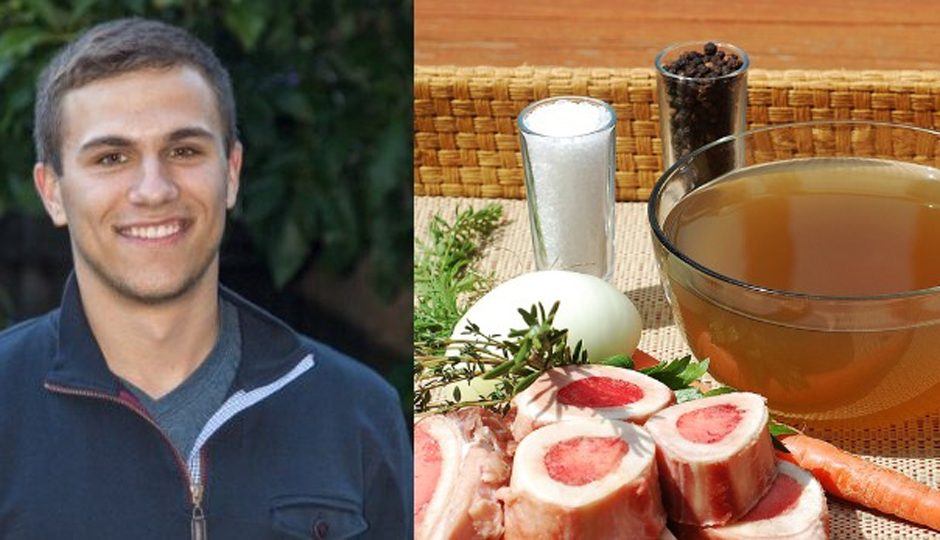Meet the 19-Year-Old Who Sold Bone Broth Online Before He Even Knew How to Make It
Nick Mares hopes the latest health fad is here to stay.
Over the past few years, bone broth (yes bone broth) has become an increasingly popular way to help alleviate joint and stomach pain, boost your immune system and brighten skin. So what exactly is bone broth? It’s basically soup stock made with animal bones roasted and simmered with vegetables for hours and hours. Call it yucky if you must, but believers say the long cooking process releases vitamins and minerals that have serious healing powers.
Bone broth got a big push into the American consciousness when Kobe Bryant of the Los Angeles Lakers used it in 2013 to help heal from a ruptured Achillies tendon followed just eight months later by a fractured knee. He’s finally ready to play again when the 2015-2016 season kicks off soon.
So Mares, a 19-year-old who spent much of his life living in Royersford, Pa., decided he’d launch an organic beef bone broth company to capitalize on the trend. It’s called Bone Broths Co. and Mares bills it as the first grass-fed certified bone broth company that’s shelf stable. Like Kobe, Mares had knee surgery, but he had trouble finding the bone broth he’d been hearing so much about — which spurred his curiosity.
“Bone broth has been around for thousands of years, but I liken the new interest in it to coconut water or kombucha five years ago,” said Mares. “They were unknown before people made them accessible to the public.” He’s got a point, coconut water is now a $400-million-per-year industry, and companies like Zico and Vita Coco are household names. Meanwhile, bottled kombucha tea seems to be popping up at plenty of convenience stores and bodegas.
Wait, what about college? Mares spurned the typical route and instead interned at Curalate and worked briefly for Zoomer (both Philly startups) before going out on his own. He also spent some time taking a Philly Startup Leaders course on coding.
Like many entrepreneurs Mares wanted to determine if a market existed for his product before spending too much time, effort and money. So he put a simple website online to see if it would get any clicks. Soon, he started getting orders. Lots of them. That’s when he began to freak out a little bit. Making his own bone broth in his family’s kitchen didn’t seem feasible, so he set out to find a packager. As for the customers who ordered, Mares came clean and told them that he was just trying kick-start a new company — but he loved their response.
“The customers understood what we were doing, some were rooting for me,” he said. “They knew I was young, so I gave them a discount. I call them our star customers.”
Finding a packager was another adventure entirely.
“I called over 500 co-packers. None of them could do it. It was insane,” he said. After eight months, he finally found a co-packer, but after doing some due diligence, he found that the company’s infrastructure couldn’t handle it. The packer told Mares he’d have to pay thousands for the staff and equipment, so he went back to the drawing board.
Then Mares pulled a surprise move — he emailed Mark Cuban. Yes, that Mark Cuban, the Shark Tank investor and Dallas Mavericks owner who’s fast becoming an icon in the venture capital world. To Mares’ surprise, Cuban wrote back, encouraging him to keep after his dream and offering the name of a partner who had connections to packagers. Finally, Mares got his product created and shipped to his first customers.
While he hoped Cuban would invest, it never worked out. (Cuban is not a fan of pre-revenue companies and isn’t very connected in the food space) but Mares sends him and his team monthly updates. You never know.
Mares is now based in San Francisco where his brother lives, and says the company is humming along well. (It would have been great to keep the company in Philly, but we understand!) Bone Broths Co. sells for $11.99, and each unit holds two servings. Shipping costs are between $10 and $12, but are free with the purchase of six units. Still, Mares says it’s cheaper than buying grass fed bones and making bone broth at home.
“We’re now post revenue and doing ridiculously well,” said Mares, who hopes to branch out from online orders and start moving the product into stores soon.
The whole story may have been different if Mares never needed knee surgery or could have easily found organic bone broth on his own.
“Looking back I’m glad I didn’t drink it,” he said. “It proved there was a need.”



